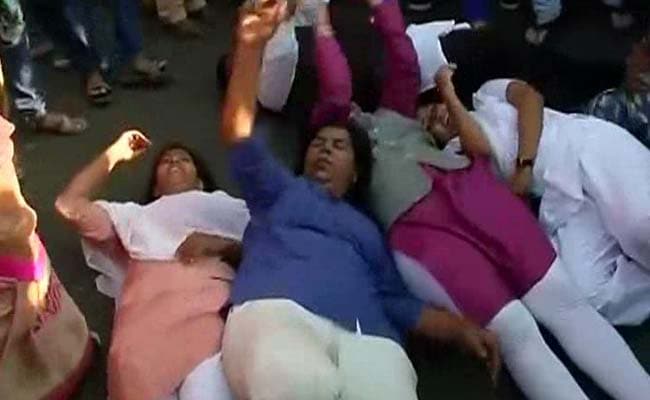
Protests against the ban on women entering Shani Shingnapur temple
- If women enter temples, does it affect purity, asks Bombay High Court
- Activists have protested ban on women entering Shani Shingnapur temple
- Women aren't allowed to enter inner chambers of the temple
Did our AI summary help?
Let us know.
No law prevents women from entering a place of worship; if men are allowed, then women too should be permitted access, the Bombay High Court said today. The judges have given the Maharashtra government two days to explain the gender bias enforced at a famous temple dedicated to Shani, or Saturn.
The Shani Shingnapur temple in the Ahmednagar district, 300 km from Mumbai, has for centuries barred women from its inner sanctum. In January, a group of women activists led by Trupti Desai threatened to force their way into the shrine as locals in the area, including hundreds of women, lined up to prevent that from happening. The activists were detained by the police en-route to the temple.
Chief Minister Devendra Fadnavis had supported a revision of the rules by tweeting at the time, "A change in tradition in accordance with the times is our culture. Discrimination in worshipping is not our culture."
The newly-elected head of the trust that governs the temple is a woman, and she has said the rules enforced for years should not be updated.
"It is the state government's duty to protect the rights of
women...if it is the sanctity of the deity that you are worried about, then let the government make such a statement," said the court today.
Last November, after a woman worshipper climbed onto the platform where the idol is placed , a priest held a cleansing ceremony and bathed the area with milk and oil.
The court also told the Maharashtra government to publicize laws which warn of six months in jail for anyone who restricts entry to a temple in the state.
The Supreme Court is separately deciding whether to end the ban on women of reproductive age being allowed into the famous Sabarimala Ayyappa temple in Kerala. The Congress-led government in the state has supported the restriction, which the temple's trust has refused to reconsider.
The Shani Shingnapur temple in the Ahmednagar district, 300 km from Mumbai, has for centuries barred women from its inner sanctum. In January, a group of women activists led by Trupti Desai threatened to force their way into the shrine as locals in the area, including hundreds of women, lined up to prevent that from happening. The activists were detained by the police en-route to the temple.
Chief Minister Devendra Fadnavis had supported a revision of the rules by tweeting at the time, "A change in tradition in accordance with the times is our culture. Discrimination in worshipping is not our culture."
The newly-elected head of the trust that governs the temple is a woman, and she has said the rules enforced for years should not be updated.
"It is the state government's duty to protect the rights of
women...if it is the sanctity of the deity that you are worried about, then let the government make such a statement," said the court today.
Last November, after a woman worshipper climbed onto the platform where the idol is placed , a priest held a cleansing ceremony and bathed the area with milk and oil.
The court also told the Maharashtra government to publicize laws which warn of six months in jail for anyone who restricts entry to a temple in the state.
The Supreme Court is separately deciding whether to end the ban on women of reproductive age being allowed into the famous Sabarimala Ayyappa temple in Kerala. The Congress-led government in the state has supported the restriction, which the temple's trust has refused to reconsider.
Track Latest News Live on NDTV.com and get news updates from India and around the world

